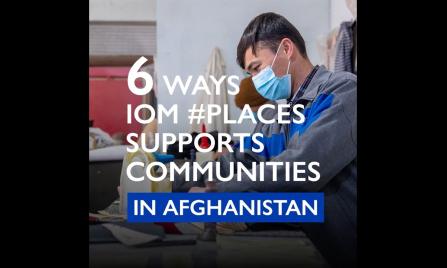-
Who We Are
WHO WE AREIOM is the leading inter-governmental organization promoting humane and orderly migration for the benefit of all, with presence in over 100 countries. IOM has had a presence in Afghanistan since 1992.
About
About
IOM Global
IOM Global
-
OUR WORK
Our WorkAs the leading inter-governmental organization promoting since 1951 humane and orderly migration, IOM plays a key role to support the achievement of the 2030 Agenda through different areas of intervention that connect both humanitarian assistance and sustainable development. Across Afghanistan, IOM addresses capacity building in migration management, migration and development development, migrant assistance and labour migration.
Cross-cutting (Global)
Cross-cutting (Global)
- Data and Resources
- Take Action
- 2030 Agenda
PLACES is IOM Afghanistan’s approach to area-based response. It comprises spatial profiling, using data from the Displacement Tracking Matrix (DTM), to obtain multi-layered information on the mobility, vulnerabilities, and needs of displaced and mobile populations and their host communities, combined with Community-based Planning (CBP). The spatial profiles at province, district and community level allow IOM to build on context-specific local capacities, including community governance structures, existing essential services networks, and market systems (where possible). Evidence from the spatial profiles informs and enhances the Community-based Planning (CBP) process by ensuring that communities’ needs, expressed through inclusive planning workshops where strategic Community Action Plans are developed, are addressed with impactful, multi-sectoral interventions for the short-, medium-, and long-term. For example, a bridge might be built to connect an isolated community to a nearby urban area that offers job opportunities, education, and health services – rather than replicating these services locally, risking lack of staff and a critical mass of people to sustain them.
Research briefs:
- Displacement trends and challenges in Afghanistan since August 2021: Synthesis brief
- Displacement trends and challenges in Afghanistan since August 2021: Urban migration
- Displacement trends and challenges in Afghanistan since August 2021: Mental health
- Displacement trends and challenges in Afghanistan since August 2021: Infrastructure and basic services
- Displacement trends and challenges in Afghanistan since August 2021: Climate change
- Publication Release
PLACES Toolkit – For Area-Based Response and Community-Based Planning:
Community Action Plans:
